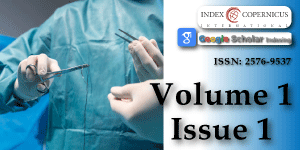Safety and effectiveness of laparoscopic management in 210 patients with erosion of adjustable Gastric banding
Main Article Content
Abstract
Background: The band erosion (BE) is defined as the partial or complete movement towards the lumen of the stomach, is also known as migration, gastric incorporation and gastric inclusion. The presentation of this complication involves failure of bariatric procedures being ineffective and consequently requires the removal of the laparoscopic adjustable gastric banding (LAGB), usually through laparoscopic surgery.
The objective of this study is to describe the clinical presentation, diagnostic methods, surgical procedure, postoperative evolution in the integral treatment of BE. Material and Methods: We captured the data of patients with BE since January 2010 to October 2017. Database included the year of patient care, age, and sex, BMI before band placement, percentage of excess weight loss, number of device adjustments, clinical data and surgical procedure performed for resolution.
Results: A total 379 LAGB complications were diagnosed in our Institution; 210 patients with BE were diagnosed and treated, the average age was 39 years; range from 19 to 66 years, sex was 178 women and 32 men. The diagnosis was endoscopic in the 210 patients (100%). The surgical procedure to solve the problem was: to remove the LAGB, the fistulous orifice was closed and patch of omentum. The hospital stay was 3-5 days. The motility was zero. Complications were minor in 3% of the 210 patients (fever, atelectasis, wound infection). One patient was re-operated for evolving to residual abscess.
Conclusions: The BE is a serious failure in bariatric surgery. The resolution in this group of patients was to remove the band, direct closure of the fistulous orifice with patch of omentum. The surgical technique that was performed in this complication is safe, effective and easily reproducible.
Article Details
Copyright (c) 2017 Valdovinos RG, et al.

This work is licensed under a Creative Commons Attribution 4.0 International License.
Sertkaya M, Emre A, Yazar ME, Bülbüloğlu E. Diagnosis and management of early gastric band slip after laparoscopic adjustable gastric banding. Wideochir Inne Tech Maloinwazyjne. 2016; 11: 121-125. Ref.: https://goo.gl/Ux4WK7
Smith MD, Patterson E, Wahed AS, Belle SH, Berk PD, et al. Thirty-day mortality after bariatric surgery: independently adjudicated causes of death in the longitudinal assessment of bariatric surgery. Obes Surg. 2011; 21: 1687-1692. Ref.: https://goo.gl/WyXiSQ
Nguyen NT, Hohmann S, Nguyen XM, Elliott C, Masoomi H. Outcome of laparoscopic adjustable gastric banding and prevalence of band revision and explantation at academic centers: 2007-2009. Surg Obes Relat Dis. 2012; 8: 724-727. Ref.: https://goo.gl/e5RA96
Carelli AM, Youn HA, Kurian MS, Ren CJ, Fielding GA. Safety of the laparoscopic adjustable gastric band: 7-year data from a U.S. center of excellence. Surg Endosc. 2010; 24: 1819-1823. Ref.: https://goo.gl/gmDNp5
Chapman AE, Kiroff G, Game P, Foster B, O’Brien P, et al. Laparoscopic adjustable gastric banding in the treatment of obesity: a systematic literature review. Surgery. 2004; 135: 326-351. Ref.: https://goo.gl/CR5qFX
Niville E, Dams A, Vlasselaers J. Lap-Band erosion: incidence and treatment. Obes Surg. 2001; 11: 744-747. Ref.: https://goo.gl/gF3VgU
Dang JT, Switzer NJ, Wu J, Gill RS, Shi X, et al. Gastric Band Removal in Revisional Bariatric Surgery, One-Step Versus Two-Step: a Systematic Review and Meta-analysis. Obes Surg. 2016; 26: 866-873. Ref.: https://goo.gl/5Th75s
Garg T, Rosas U, Rivas H, Azagury D, Morton JM. National prevalence, causes, and risk factors for bariatric surgery readmissions. Am J Surg. 2016; 1: 76-80. Ref.: https://goo.gl/CKcngK
Himpens J, Cadière GB, Bazi M, Vouche M, Cadière B, et al. Long-term outcomes of laparoscopic adjustable gastric banding. Arch Surg. 2011; 146: 802-807. Ref.: https://goo.gl/cJVFcJ
Rubenstein RB. Laparoscopic adjustable gastric banding at a U.S. center with up to 3-year follow-up. Obes Surg. 2002; 12: 380-384. Ref.: https://goo.gl/wZWoqk
Reche F, Mancini A, Faucheron JL. Gastric Band Migration Causing Jejunal Obstruction: a Life-Threatening Complication. J Gastrointest Surg. 2017; 4: 10. Ref.: https://goo.gl/vG9Hhp
Rudd AA, Lall C, Deodhar A, Chang KJ, Smith BR. Gastropericardial Fistula as a Late Complication of Laparoscopic Gastric Banding. J Clin Imaging Sci. 2017; 7: 3. Ref.: https://goo.gl/E8ok5W
Spann MD, Aher CV, English WJ, Williams DB. Endoscopic management of erosion after banded bariatric procedures. Surg Obes Relat Dis. 2017; 13: 1875-1879. Ref.: https://goo.gl/QcMj8Y
Dogan ÜB, Akin MS, Yalaki S, Akova A, Yilmaz C. Endoscopic management of gastric band erosions: A 7-year series of 14 patients. Can J Surg. 2014; 57: 106-11. Ref.: https://goo.gl/rm8Zvh
Basa NR, Dutson E, Lewis C, Derezin M, Han S, et al. Laparoscopic transgastric removal of eroded adjustable band: a novel approach. Surg Obes Relat Dis. 2008; 4: 194-197. Ref.: https://goo.gl/epUQSU
Di Lorenzo N, Furbetta F, Favretti F, Segato G, De Luca M, et al. Laparoscopic adjustable gastric banding via pars flaccida versus perigastric positioning: technique, complications, and results in 2,549 patients. Surg Endosc. 2010; 24: 1519-1523. Ref.: https://goo.gl/YPsMCk
Carelli AM, Youn HA, Kurian MS, Ren CJ, Fielding GA. Safety of the laparoscopic adjustable gastric band: 7-year data from a U.S. center of excellence. Surg Endosc. 2010; 24: 1819-1823. Ref.: https://goo.gl/UBHwXN
Eid I, Birch WD, Sharma MA, Sherman V, Karmali S. Complications associated with adjustable gastric banding for morbid obesity: a surgeon’s guides. Can J Surg. 2011; 54: 610-66. Ref.: https://goo.gl/QJ2mGy
Egberts K, Brown WA, O'Brien PE. Systematic review of erosion after laparoscopic adjustable gastric banding. Obes Surg. 2011; 21: 1272-1279. Ref.: https://goo.gl/SigGLa





